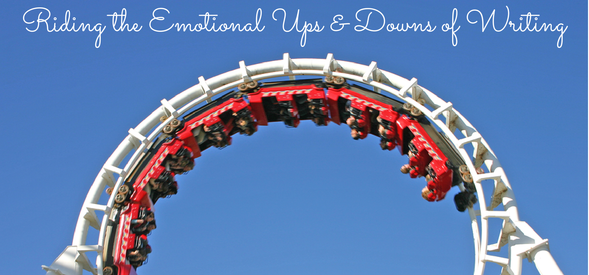As writers, we’re often either besieged by advice about our writing careers and writing projects or actively seeking out feedback on our writing or our career trajectories. Rare is the writer who never does so. And yet, when we give it the chance, our deepest writing wisdom comes from within. This isn’t to say that feedback, mentoring, and coaching isn’t also valuable, but at the end of every long writing day or hard writing decision, the person we have to answer to is ourselves. I’ve worked with mentors who don’t understand this, or care, and I’ve worked with mentors who do. The difference can be astonishing.
I began this year with an intention to focus on Deep Work. (I’ve since read the book by that name, which I’ll write about in the near future.) I’ve devoted the early part of this year to clearing the decks so I can go deeper and deeper into my writing over the course of 2017. In doing so, I had the opportunity to once again test the Writer’s Guided Visualization I developed for the Ultimate Writer’s Toolkit.
Our Most Profound Source of Guidance Comes From Within
The visualization is based on my early work as a coach, when I created my first Embrace Your Essential Self coaching program. I designed the processes and visualizations in that program to help people access their own deepest wisdom and get in touch with the essence of who they are. Last year I had the privilege of walking a client through that process again, something I don’t “regularly” do these days, but which I found bringing both of us to the point of tears again and again — the type of tears that spring into your eyes because you’re in the presence of that which is profound, wise, and greater than yourself. I was reminded why I loved that early work of mine so very much, and even why I was called to coaching in the first place: Helping people touch the power of who we truly are and how we are called to be in the world is an incredible honor.
I created the Writer’s Guided Visualization from that foundation.
When I used the visualization again myself last week, it brought home to me that my mind is often filled with chattering voices, ideas, opinions, fears, doubts, and self-sabotaging impulses that are hard to hear through or filter out. Before I listened to the 10 minute track, I scribbled down a few questions about my own writing trajectory, including:
- What’s the next best writing project for me to tackle?
- What will move me closest to the path I want to be on?
The answers I received, as I quieted my mind and listened to the wisdom my inner Writer Self had to share with me, were simple in some ways, and profound in others. Isn’t that often the truth with inner wisdom? It brings that sense of peaceful, quiet knowing to us.
Because my Writer Self knew about my intention to go deep, she knew just what to say about where my deep work lies. I’ve been continuing the conversation with her since our last meeting, as I fall asleep each evening.
Two Powerful Methods to Access Your Inner Writing Wisdom
If you want to experiment with this yourself, here are two ways you access your own inner writing wisdom.
- Guided Visualization or Meditation. Visualization, or meditation, if you prefer the term, is my favorite method for helping myself and my clients access our inner wisdom. You can do this on your own, or I can walk you through it in the Writer’s Guided Visualization in the Toolkit. Start by jotting down your questions, then relax your mind and body with a simple progressive relaxation, and then have a brief conversation with your future Writer Self in a cozy place, with time and space to listen for the answers. When you’re done listening, open your eyes, and write down the insights you received. My experience with this technique is that it is a profound source of wisdom, reassurance, and calming. Our higher, wiser Writer Selves know what’s what, and they’re ready to share it with us.
- Journaling. Alternatively, you could use a similar technique with journaling. In this case, you would use your morning pages or journal to dialogue with your future Writer Self (much as you might do with a character in your novel) and converse with her/him about the questions you have. Ideally you’ll shift yourself into something of a relaxed state first, either by taking deep breaths, closing your eyes, meditating, or otherwise changing your mental state into a more open, receptive place. Some writers also find that writing the responses with their non-dominant hand helps access more of their subconscious mind and deeper insight.
The key to either approach is to not censor anything that comes from your inner self and just letting the answers flow with as little mental interference from your conscious mind as possible. I know for myself, with my strong mind that likes to run the show, I have to consciously quiet it with the relaxation techniques of the visualization or another meditation method in order to cut through the chatter and opinions my conscious mind likes to toss into the ring.
The beauty of tuning to your inner voice is not only that you can gain valuable insight for your writing projects, process, career, and life, but also that by listening regularly to what your deeper self has to say, you strengthen your access to your inner wisdom and your sense of what’s right for you and your stories.
Your writing will only become stronger through this knowing of yourself.
![]()
You may also like:
- The Magic of Creating a Writer’s Schedule
- 3 Tips for Staying Energized When Writing a Book (or Script!)
- Writing With Intention: The Power of Journaling About Your Writing Process
- Free Guide: “How to Choose Your Next Book (Or Screenplay)“


 Note from Jenna: This guest post from one of my screenwriting colleagues and best friends, Isabel Holtreman. Isabel is a talented writer and is one of my most trusted feedback sources, both for my writing itself and for emotional support around the challenges of writing. I’m thrilled she was willing to take the time to talk with us today about navigating the emotional ups and downs of writing, and how she does it.
Note from Jenna: This guest post from one of my screenwriting colleagues and best friends, Isabel Holtreman. Isabel is a talented writer and is one of my most trusted feedback sources, both for my writing itself and for emotional support around the challenges of writing. I’m thrilled she was willing to take the time to talk with us today about navigating the emotional ups and downs of writing, and how she does it.
